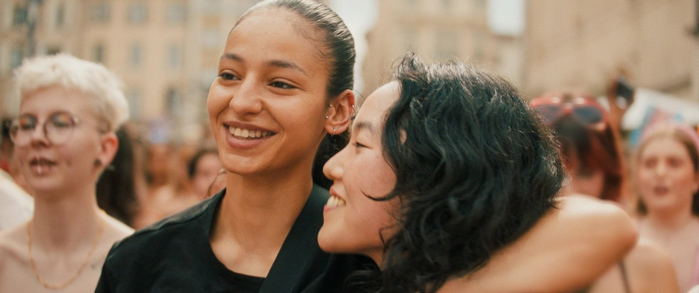The Lost Daughter: Herzi Passes Up Potency in Standard Adaptation
“My name is Fatima,” is one of the constant refrains utilized in Fatima Daas’ celebrated first novel The Last One (2020), a fragmented piece of auto-fiction which parallels the author’s own life experiences growing up as a French Muslim woman in the Paris suburbs while discovering her sexuality. This constant attempt to establish herself as the woman she’s expected to be versus the woman she wants to be is evident in every passage of a poetic inferno, something lost in translation with Hafsia Herzl’s adaptation, La petite dernière The Little Sister. A silver lining is how Herzi brings a tangibility to her heroine’s experiences, brought to blazing life by compelling newcomer Nadia Melliti. But there remains a core absence in the film’s trajectory, which utilizes familiar beats (set to a Kim Ki-duk reminiscent season cycle, Spring, Summer, Fall, Winter…and Spring) and cliched elements softening the blows, criticisms, and self-reflection penned by Daas.
Fatima (Melliti) is about to finish her final year of high school. She is the youngest daughter born to a family of Algerian immigrants and she’s struggling to navigate her reality as a lesbian. While several classmates are able to assume the truth, all others turn a blind eye, including a young Algerian man she’s been seeing who seems eager to ask for her hand in marriage. Fatima’s ambivalence towards him finally wins out, and she’s eventually free to build a new identity while at university in Paris. However, Fatima finds it difficult to be herself, divulging fake identities to the women she meets via online dating apps. A chance encounter with Ji-Na (Park Ji-min) finds her head over heels in love…until she’s suddenly abandoned, leaving her undecided about how she will move forward.

For those familiar with the novel, it’s curious what Herzi decided to omit, namely Daas’ theme of significant time spent on public transportation to get to school. It’s a key element in her expression of anger, frustration, and rage. Melliti brings an almost entirely different energy as Fatima, coolly confident and self-assured, even as she’s navigating a brave new world of queer hook-up culture where a vulgar casualty reigns supreme. Daas details intersecting multiple relationships often used as a distraction from the woman she pines for, if mostly because her unavailability makes her attractive. This figure is personified by Park Ji-Min (of Davy Chou’s Return to Seoul, 2022), a nurse Fatima is introduced to at a class teaching life skills to those living with asthma. Theirs is a heady, swooning romance ending abruptly due to Ji-Na’s debilitating depression, and marks Fatima with her first significant, formative bout with heartbreak.
The sequences which stand out include Fatima’s lashing out at a gay classmate in high school who accuses her of being a lesbian, a highly charged moment having a profound effect on her. Likewise, the first hook-up encounter she experiences with an older woman who teaches her a few things about what two women can do together in bed. But there are some jumbled up details about Fatima’s characterization, including her struggle in reconciling her religious beliefs with her sexuality, administered quite late in the film, and without any corresponding sequences. Likewise, Herzi decides to pare down Fatima’s strained relationship with her parents, which particularly changes the film’s final sequence in exchange between mother and daughter over homemade madeleines, a Proustian parallel which has a much more profound effect in the novel. As it stands, the film feels like a pared down version of Blue is the Warmest Color (2013), as well as quite reminiscent of Danielle Arbid’s Parisienne (2015), about a heterosexual Lebanese woman finding herself in Paris.
Kudos to Herzl’s stylistic choices (including some soundtrack selections, including KOMPROMAT) and her continued exploration of women furthered into the fringes due to circumstance, such as the lonely woman at the center of Good Mother (2021), but her Kore-eda reminiscent title The Little Sister doesn’t convey the immediacy of its text source, and thus risks seeming like countless other coming out stories despite cultural specificities.
Reviewed on May 16th at the 2025 Cannes Film Festival (78th edition) – Competition. 106 Mins
★★½/☆☆☆☆☆


